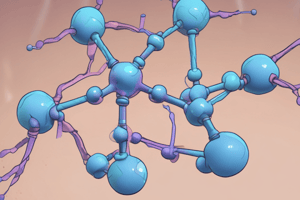Podcast
Questions and Answers
Which of the following is true about anchor residues in MHC molecules?
Which of the following is true about anchor residues in MHC molecules?
- They determine the optimal length and amino acid sequence of peptides that can bind to MHC molecules
- They are located in the peptide-binding clefts of MHC molecules (correct)
- They are recognized by the antigen receptors of T cells
- They project upward and are displayed on the surface of antigen-presenting cells
Which of the following is true about the peptide display function of MHC molecules?
Which of the following is true about the peptide display function of MHC molecules?
- MHC molecules have a narrow specificity for peptide binding
- Peptides are recognized by the antigen receptors of B cells
- Each MHC molecule can present only one peptide at a time (correct)
- Each MHC molecule can present many peptides at a time
What is the role of anchor residues in determining peptide binding to MHC molecules?
What is the role of anchor residues in determining peptide binding to MHC molecules?
- Anchor residues anchor the peptides in the cleft of the MHC molecule (correct)
- Anchor residues project upward and are recognized by the antigen receptors of T cells
- Anchor residues determine the length and amino acid sequence of peptides that can bind to MHC molecules
- Anchor residues are located in the floors of the peptide-binding clefts of MHC molecules
What is the mechanism by which MHC molecules display peptides?
What is the mechanism by which MHC molecules display peptides?
What percentage of MHC molecules on an APC need to display a peptide to initiate an immune response?
What percentage of MHC molecules on an APC need to display a peptide to initiate an immune response?
Why do we not develop autoimmune responses to self antigens?
Why do we not develop autoimmune responses to self antigens?
During viral infections, which proteins are preferentially presented by MHC molecules?
During viral infections, which proteins are preferentially presented by MHC molecules?
Which of the following is true regarding the antigen display function of MHC molecules?
Which of the following is true regarding the antigen display function of MHC molecules?
Which of the following is true regarding the stability of MHC molecules on cell surfaces?
Which of the following is true regarding the stability of MHC molecules on cell surfaces?
What is the mechanism by which class I MHC molecules acquire their peptides?
What is the mechanism by which class I MHC molecules acquire their peptides?
Why are MHC molecules able to present foreign antigens despite the presence of self antigens in an APC?
Why are MHC molecules able to present foreign antigens despite the presence of self antigens in an APC?
Flashcards are hidden until you start studying




